Last Updated on December 15, 2023
Barista used to be an obscure job. With the emergence of coffee shop culture in North America over the past two decades, it’s now a position that’s widely sought.
As independent and artisanal shops become increasingly favored over the once-dominant chain brands, the expectations and skills required of new baristas has increased. So has competition for these coveted positions.
The good news is that coffee culture shows no signs of slowing, and busy cafes will always require quality employees. But barista training comes in many forms, and if you’re looking to start or advance your barista career, it can be hard to know which path to choose.
How can you become a barista without experience? You can pay money for training and certification. You can read books and watch YouTube videos. Or you can just walk into your local coffee shop with a smile on your face and offer to do whatever needs to be done, then take it from there.
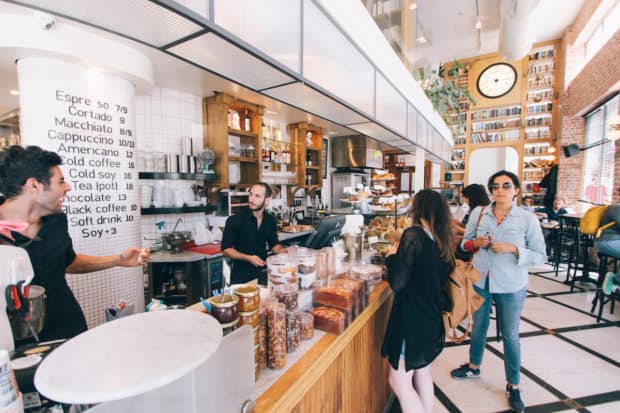
We’re not here to declare one path the best, but we have invited baristas and former baristas who have made a career out of coffee, to offer some tips for new baristas.

For anyone interested in a career in coffee or being a barista, my advice is that being a barista can be incredibly rewarding with the right mindset. The baristas that work the floor, dial in coffees and serve drinks with high standards, all while giving thoughtful service and placing the priority on the people they serve and the supply chain, are really the people that will shape what the industry looks like to your average consumer. The baristas are the ones that are showing up, cleaning bathrooms, making connections with people over little kindnesses, and ultimately giving meaning to coffee.
— Kay Cheon
If, after reading the experts’ words, you decide that certification is the way you want to go, you should be able to find a calendar of training offerings at the website of your country’s Specialty Coffee Association.
If online barista training appeals to you, a few minutes of searching will turn up plenty of multi-module video courses.
If you want to go straight to on-the-job training, understand that the high-end cafés usually want an experienced barista who is ready to step behind the bar. Your best bet is to project a winning personality, a passion for coffee and a willingness to learn, and find a place that’s willing to teach you about the coffee.

Be loyal and show genuine gratitude to those who help you along the way. Locate appropriate (and willing) mentors. There’s something you can learn from any situation and group of people. Find the most experienced person in the group and pay attention to them. The knowledge and support that others share with you often comes from years of effort and experience. Respect the time that it took.
When you’ve got some experience yourself, don’t forget to share it with those who are just starting out themselves.
— Will Frith
What are your expectations?
Do you want this to be a part-time job while you go to school or fund other passions, or is it a career that you hope to progress and advance in? Both are worthy undertakings, but knowing this will help you choose where to apply, and how much additional study and practice to put in, both before applying and while on the job.
Either way, what’s most important is that you bring your best to it, regardless of your career trajectory.

Although I operate as a barista, that’s only a fraction of the work I’ve put into growing my business. I had to train myself to become an owner/operator. Had I only operated as a barista, Gilly would not be where it is today. Without a plan I would naturally default to just creating innovative drinks. The reality though is, to have a sustainable company it requires way more what most people see behind the bar.
— Daniel Brown
You’ll also want to keep in mind that barista positions typically start at minimum wage. You will likely receive some gratuities, but they usually add only a dollar or two per hour to your wage. That said, if you have a passion for coffee and this is your chosen career path, there are myriad ways to advance into management, ownership, coffee expert, or world-class barista superstar.
How to become a barista with no experience
Some cafes require that you have previous barista experience, but most will be willing to train you on the job. You may have to start as a cashier or doing simple food service while you learn the intricacies of the espresso machine. If you show an interest and do a bit of homework, most places will reward your initiative and bring you quickly up to speed.

I think getting some barista training in the form of a class is a great start, but in all reality you will learn your skills on the job.
Apply for a counter service position with the goal towards learning your way around machine and grinder as you work your way up. If you are a valuable employee and show initiative, those with the skills will be more than happy to show you what they know. Get hands-on and learn in the quiet periods, and work hard doing everything else during the busy times.
— Brad Bonar
What’s most important to employers is that you have a great attitude and work ethic, and are able to engage knowledgeably with customers. Working in a coffee shop can be a demanding, fast-paced job. It requires efficiency and attention to detail, as well as a positive attitude. If you bring those to the table, you will be a joy to train and a valued employee.
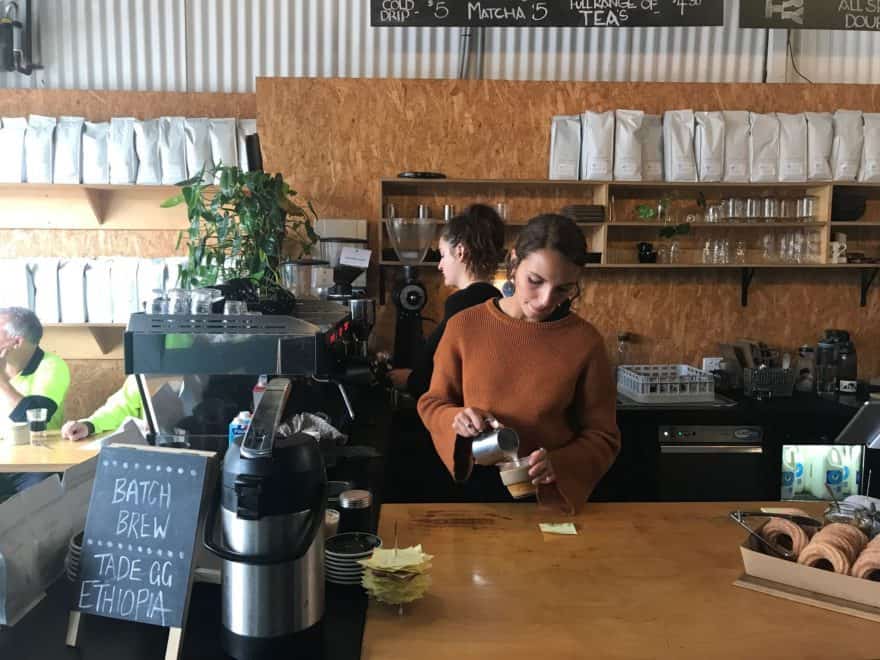
At what age can you be a barista?
In most states and Canadian provinces, the minimum age to work as a barista is 16 years old. Most coffee shops have no license to serve alcohol, but if you want to work behind the bar in a licensed establishment that also happens to serve espresso, cappuccinos and lattes, you will most likely need to meet the minimum legal drinking age in that jurisdiction.
What does a barista actually do?
This might seem like a simple question, and people often assume it’s a simple job, but being a barista is a demanding job that requires a lot of multitasking, focus, and often encompasses much more than just making coffee.
Customer service
First and foremost, this is a customer service position. You’ll be required to interact with customers in an efficient and friendly manner. Any coffee shop worth its beans would only ask that you be yourself, but we’ve all been served in a cafe or restaurant by someone who would clearly rather be somewhere else. It’s never a great experience for anyone involved.
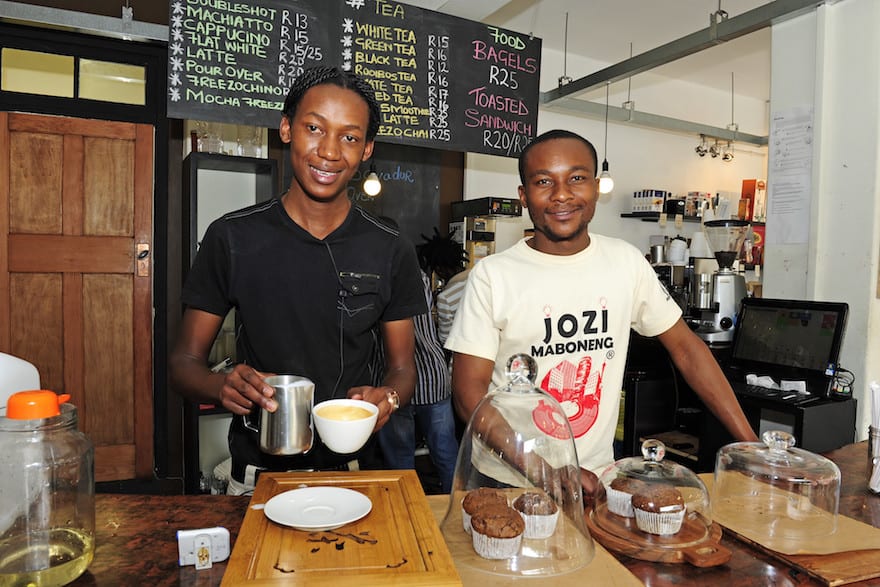
So if you’re considering becoming a barista, make sure you enjoy chatting with people and can take a little guff from a customer or two (because you’ll certainly get it). The upside is that, in my experience, the vast majority of people are a delight to engage with and you’ll likely become rather attached to many of your regular customers, not to mention your co-workers.

I actually suggest getting a job as a server, busser, or bar back at a restaurant. My career started at a pool snack bar, followed by my first ‘real’ job at a Rita’s Water Ice (the real ones know), then I was a hostess at an Uno’s Chicago Bar and Grill (I was awful). I then served at probably six or seven restaurants, did some bartending, and then FINALLY got a barista job.
Restaurant work teaches you that you are part of a system and helps you learn to see multiple aspects of service at one time. I believe that most baristas are severely under-educated in the field of hospitality and that most coffee shops don’t teach it.
— Elle Jensen
Crafting coffee drinks
If you aim to advance beyond cashier, you’ll have to master the espresso machine. This can seem daunting, particularly if you find yourself in an artisanal cafe that prides itself on its high-level drink creations, but never fear—it can all be learned.
There are several keys to crafting a next-level coffee beverage. They include:
- Pouring the perfect espresso, which involves adjusting the grind and perfecting your tamp method to ensure you’re getting a shot that runs between 20-30 seconds and is beautifully layered and topped with rich crema.
- Texturing milk by mastering the whirlpool method. It’s all about jug and steam wand placement. Remember: Don’t overheat it! The key to that sweet, creamy steamed milk is the temperature.
- Mastering your latte art skills. Some take to this easily. It took me years.
- Developing your palate so you can taste the subtleties between coffee blends, roasts, and preparations. This is advanced and certainly not required unless you have lofty aspirations for your coffee career, which perhaps you do.
- Care about what you’re doing. It shows.

The best early decision I made to build my career as a coffee professional was to compete in my first barista competition. Being involved in the coffee community has been one of the biggest assets to building my career. I believe that networking and building lasting, meaningful relationships within the community are key.
— Stacey Lynden
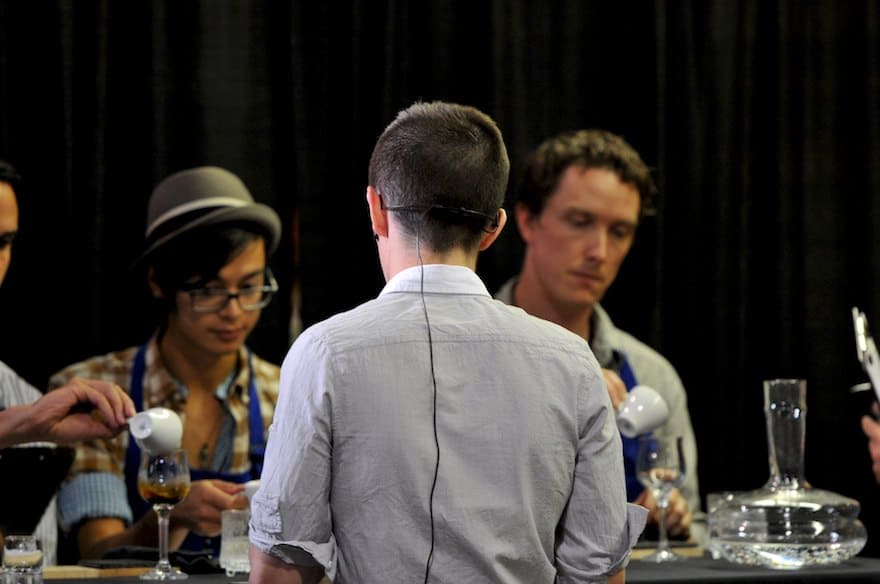
Menu knowledge
It’s important to be able to speak about what you’re serving. Even if you’re starting out as a cashier and learning the espresso machine incrementally, you’ll be expected to know what your cafe offers, and communicate effectively with customers. If you don’t know the difference between a latte and a macchiato , for instance, you should do some homework before applying.
Food preparation and service
Some coffee shops focus on beverages, perhaps offering a few pastries brought in from off site, but many cafes now offer at least a limited menu of breakfast and lunch items. You may be required to do some basic cooking and meal preparation, as well as simple table service.
Cleaning and maintenance
It’s not all fun and games. Each shift will likely include some combination of cleaning duties, including a daily deep flush of the espresso machine at the end of service. As in most restaurants and cafes, there are a variety of small maintenance and cleaning jobs necessary to keep the place compliant with food safety regulations and running smoothly.

First, ask a few introspective questions:
Do you like the career you already have? If so, stay with it and keep coffee as a hobby. If not, then continue forward.
Have you ever worked in food service or customer service? If no, consider how you respond when people are less than kind to you. Coffee at the end of the day is a service career.
Have you worked in a cafe or coffee shop before? If not, go do that. Try it out for a month or two. The hours are less than ideal—weekends, holidays. Also the pay is pretty low for the entire industry, and benefits are pretty minimal. It really needs to be a passion project or a labor of love.
— Kyle Ramage
How to get a job as a barista
Now that you know what to expect from the position and what’s expected of you, how do you go about actually getting the job? There are a multitude of opinions and approaches, but here are a few things you might want to try and some resources to start building your knowledge.
Visit the cafe
If you have a favorite coffee shop in mind, somewhere you’ve always wanted to work, then go there. A lot. Become a regular and chat up the baristas. They might end up being your co-workers, so get to know them a little. If you show a keen interest and ask the right questions at the right time (not when they’re 10 coffees deep in the middle of a rush), they’ll know you’re eager when you finally bring your resume by.

Coffee can be intimidating. I know it certainly was for me. I spent a lot of time in shops through high school and college and would spend a lot of time just watching the bar flow of a cafe. I was a pretty avid home brewer, and watched the barista championship long before I knew anything really about coffee. It was enough for me to have a semi-educated conversation with a barista, but I still was too intimidated to apply anywhere.
My first cafe job I got from those conversations I would have about coffee. There was a pop-up cafe that was promoting a larger shop opening shortly after. I just asked a bunch of questions about the coffee because it was tasty and I genuinely wanted to know about it. By the end of the conversation, the manager encouraged me to apply and next thing you know, I was in my first specialty coffee scene!
— Emily Orendorff
Be persistent (but not annoying)
Cafes and restaurants receive a lot of resumes. If they’re not hiring at the time, they might keep your resume on file, but more often than not it’s about the right candidate showing up at just the right time. If you’ve already applied but they were fully staffed at the time, it can help to re-state your interest again a few months later but don’t become a pest.
Becoming a favored regular is really the best way to have them think of you when a position does become available, not to mention giving you a head start on their menu and particular culture.
Get experience
If you dream of working at the hip little cafe in your neighborhood that always makes you the perfect latte with that unmatched rosette on top, but you have absolutely no experience, you might consider starting at one of the larger coffee chains to get the basics down pat. I started at Starbucks many moons ago, and although the newer automatic machines have taken much of the skill and romance out of making drinks, I would bet chain coffee shops are still a great place to learn the ropes in a fast-paced and demanding atmosphere.

There’s nothing quite like learning in that café environment. You can put a lot of practice into getting better. On top of the training the company provides, supplement that with books and resources to continue to push yourself, and be able to put any theory to the test at work.
Everything you learn outside of café work is like taking driver’s education and completing a test. To become a good driver, you have to put in the hours driving out in the real world. To me, that’s working in the café.
— Karine Ng
Stay informed
With endless information literally in the palm of your hand, it’s easier than ever to stay informed and up to date on what’s going on in your chosen industry. Follow your favorite coffee shops on social media to keep in touch with what they’re up to (many shops will also post when they’re hiring). Check out blogs and videos to keep up with trends and local events.

I’d say to young or new baristas who want to learn more, to use social media to their advantage. Almost every major coffee company has a presence on Facebook or Instagram where you can read about their mission, their favorite coffees, where they buy and their relationships with farmers.
If you are able to afford it, join SCA and learn the leadership faces. Email them and call them about the tiniest questions. Trust me, they want to help. That information is just as vital as how to pour a latte and it retains the most important part of the coffee industry: the people and the culture.
— Kristina Jackson
Educate yourself
If you’re still finding it difficult to break into the industry, or just want to arm yourself with the best set of tools before taking the leap, there are several ways you can educate yourself and start training on your own time.
Watch videos
The internet saves the day yet again! Endless hours of cool coffee tutorials, documentaries, demonstrations, tasting notes, and anything else you can dream up are all but a click away. Most of it is free. If there’s something you want to learn about, whether it’s how to pull the perfect shot, create beautiful latte art , or what the difference is between fair trade and direct trade coffee, there’s a video out there for you.
Practice at home
If you’re lucky enough to have a decent home espresso machine, or know someone who does, practice pulling shots and steaming milk. Offer to make coffee for all your friends and family. It will go over well, trust me.
If you don’t have access to an espresso machine, spend $30 on an AeroPress or even less on a pour-over setup and start playing around with different coffee beans, grind sizes, and preparation methods to hone your skills and develop your palate.
Take an online barista course
If you’re someone who benefits from structure and likes to be guided through things in detail, you can check out online barista certification classes such as Barista Hustle . As I mentioned, most coffee shops will be willing to train you on the job, but it never hurts to come armed with as much knowledge as you can gather. In an increasingly competitive field, it doesn’t hurt to position yourself ahead of the curve.
What is barista training?
Barista training courses cover some of the theory and science behind coffee extraction, along with plenty of hands-on “lab” work on various brewing methods. They should also teach you how to taste coffee, detect its aroma and flavor notes, and describe them. Some will include training on workstation and equipment maintenance.
If you want to get a feel for what barista training looks like in practice, I encourage you to read this post by Ulla Suoraniemi of Helsinki’s Paulig Barista Institute. She describes a day in the life of a barista trainer, and while it’s written from her perspective, it certainly covers what you could expect as a student.

I invested in barista education with the Barista Guild. I got support from the company I was working for, which helped financially a ton at the time. But getting the chance to earn my barista certificates at barista camp embedded me into the community of baristas across the globe. I met so many inspiring people who I still connect and collaborate with today.
I started with books and YouTube videos when it was just beginning. I would definitely recommend using those tools, but they won’t be as valuable as the community aspect of joining the guild.
— Sam Schaefer
How much does it cost to do a barista course?
The cost of a barista course varies widely depending on the duration and depth of the course. Online courses typically run between $50 and $200, but if you want to take formal training in person at an institute or specialty coffee shop, you’re probably looking at about $500 per day. Some will have half-day courses for around $250, others might have two-day courses in the $1,000 ballpark.
Is barista training worth it?
If you’re intent on building a career as a barista and you can afford the cost, formal barista training isn’t a bad investment. You will learn important skills and have something to put on your resume. But don’t think for a second that it’s absolutely necessary. You can certainly build all the skills you need by learning on the job, and it won’t cost you a cent. In fact, you’ll get paid!
And of course, if you have no career aspirations as a barista and just want to do it as a part-time job to earn some extra cash, then spending a lot of money on formal training kind of defeats the purpose, doesn’t it?

Keep networking and keep growing. One of the realities with coffee is that growth is often limited based on your employer. So if you’ve maxed out your growth with your current company, then don’t be afraid to move on to where you can keep growing. But pay your dues and stick with one place for at least two years, otherwise you’ll get the reputation of being that barista that jumps ship every three months and no one will hire you.
The coffee industry is exactly what you make of it. I’ve trained, managed bars, assistant roasted, co-opened a roastery, guest-blogged, and most recently published a barista coffee ebook. Your opportunity and future is as narrow or vast as you choose it to be for yourself. It’s completely up to you.
— Phil Cook
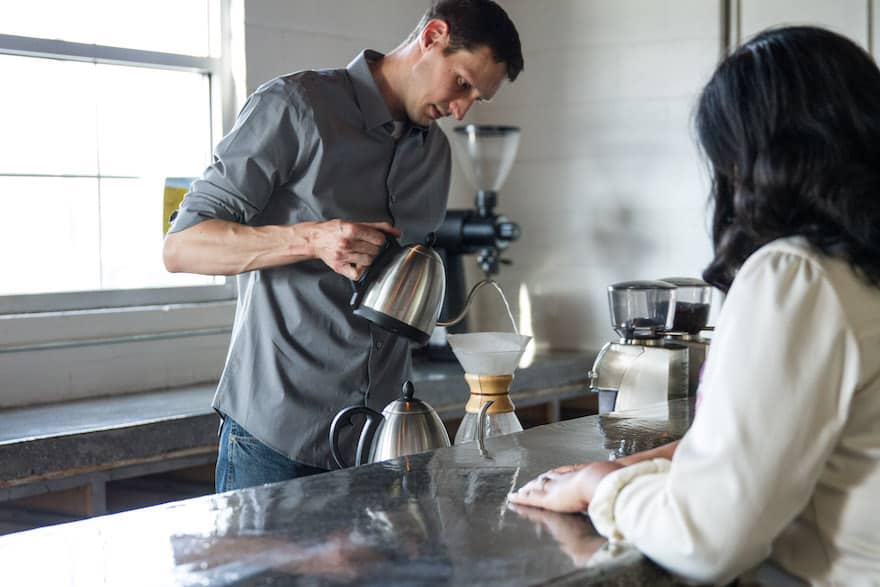
Go for it
Being a barista was one of my favorite jobs of all time. I personally love the science and skill required to make a beverage that inspires, but above all I cherish the relationships I made on both sides of the counter. It was a challenging and often exhausting job, perhaps best suited for the young and vibrant amongst us, but it will forever remain one of the best periods in my life.
If you’re considering becoming a barista, there’s no end of resources out there to help you along. As many of the professionals we consulted have said, immersing yourself in the culture is the best place to start. With their words in mind, we hope you’ll take charge of your own barista training and find a way into the coffee community.
Your time behind the bar might only be the start.



I would like to be a humble and hardworking coffee beginner in all training sessions.thank you